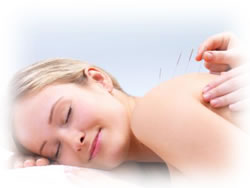Services
ACUPUNCTURE
What is Acupuncture?
Acupuncture is a method of encouraging the body to promote natural healing and to improve functioning. The core intention is to balance the body’s own energy. This is done by inserting and stimulating needles at specific acupuncture point’s locations.
 How does it Work? How does it Work?
The classical Chinese explanation is that channels of energy run in regular patterns through the body and over its surface. These energy channels, called meridians, are like rivers flowing through the body to irrigate and nourish the tissues. An obstruction in the movement of these energy rivers creates a backed up following a ”stuck –ness” of normal function.
The meridians can be influenced by needling the acupuncture points; the acupuncture needles unblock the obstructions, and reestablish the regular flow through the meridians.
Acupuncture treatments can therefore help the body's internal organs to correct imbalances in their digestion, absorption, and energy production activities, and in the circulation of their energy through the meridians.
The modern scientific explanation is that needling the acupuncture points stimulates the nervous system to release chemicals in the muscles, spinal cord, and brain. These chemicals will either change the experience of pain, or they will trigger the release of other chemicals and hormones which influence the body's own internal regulating system.
Recently some studies suggest changes of blood circulation and levels of oxygen on brain tissue during acupuncture treatment.
The improved energy and biochemical balance produced by acupuncture results in stimulating the body's natural healing abilities, and in promoting physical and emotional well-being.
Is Acupuncture painful?
An acupuncture needle is very thin, and their insertion is virtually painless. Some needling sites will produce very little sensation, and you may not even know the needles are in place. Other sites may produce a sensation of tingling, electricity, heat, cold, heaviness, or an achy sensation. Upon insertion, the client may feel a slight sting or prick. Once the needle is inserted, there should be no pain. Normally there is a comfortable feeling during the treatment. If you experience pain, numbness, or discomfort, please notify the acupuncturist.
There may also be a sensation of qi moving up or down the channels. The vast majority of people find acupuncture to be very relaxing, and many will even fall asleep during treatment.
Why Does Acupuncture Work?
Several processes have been proposed to explain acupuncture's effects. Here are some theories about how acupuncture may work.
Conduction of electromagnetic signals: acupuncture influences electrical currents of the body. Western scientists have found evidence that acupuncture points are strategic conductors of electromagnetic signals. Stimulating points along these pathways through acupuncture enables electromagnetic signals to be relayed at a greater rate than under normal conditions.
These signals may start the flow of pain-killing biochemicals, such as endorphins, and of immune system cells to specific sites in the body that are injured or vulnerable.
Activation of opioid systems: acupuncture stimulates the release of pain-relieving endorphins. Research has found that several types of opioids may be released into the central nervous system during acupuncture treatment, thereby reducing pain.
Opioid: A synthetic or naturally occurring chemical in the brain that may reduce pain and induce sleep.
Changes in brain chemistry: acupuncture influences biochemical changes: the release of neurotransmitters, Studies have shown that acupuncture may alter brain chemistry by changing the release of neurotransmitters and neurohormones.
Neurohormone: a chemical substance made by tissue in the body's nervous system that can change the structure or function or direct the activity of an organ or organs.
Neurotransmitter: A biochemical substance that stimulates or inhibits nerve impulses in the brain that relay information about external stimuli and sensations, such as pain or circulation changes.
Conditions Treated By Acupuncture
• Anxiety
• Migraines and tension headaches
• Sinusitis
• Common cold
• Trigeminal neuralgia
• Tennis elbow
• Sciatica
• Arthritis
• Fibromyalgia
• Low back pain
• Asthma |
• Weight loss
• Infertility
• Bronchitis
• Digestive difficulty
• Depression
• Diarrhea
• Constipation
• Shoulder pain
• Difficulty sleeping
• Emotional difficulty
• Migraine |
• Nausea
• Osteoarthritis
• Sciatica
• Lumbago
• Stress
• Tonsillitis
• Trigeminal Neuralgia
• Wrist pain
• Carpal tunnel syndrome |
How long will it take?
There are many factors that determine how long a person will require treatment. Generally speaking, newer or more recent problems will require fewer treatments, and chronic or older conditions will take more time. Acute injuries or conditions of acute pain will be treated with greater frequency (2-3 times per week), and chronic conditions are treated less frequently.
In general terms a course of treatment of 4 to 8 sessions -depending on the 1.condition and 2.timing presented is recommended.
Do I have to keep coming back for treatment?
This is a common question, and the answer is not simple. It is recommended that you return for periodic treatments, much the same as you see your dentist. This allows your practitioner to help you maintain a desired state of health. This notion of preventative medical care is one that is considered extremely important, and education as to the importance of regular care is crucial for better health.
An Acupuncture Treatment
Before the initial appointment, clients usually complete a health history questionnaire. The acupuncturist then interviews the client, asking about his or her primary health concern, lifestyle habits, diet, emotions, sleep, temperature, appetite, stress, temperature, and seasons. During the interview, the acupuncturist examines the client carefully.
Typically, the acupuncturist will use 6-12 needles during the treatment. The number of needles used does not correspond with the intensity of the treatment; rather it is the precise placement of the needles that is important.
Treatment length varies from seconds to longer than one hour. The typical length is about 20 to 30 minutes. The acupuncturist may use other techniques within the acupuncture treatment: Such as in moxa, cupping –suction, electro stimulation, and non needle point stimulation of acupuncture points.
ACUPUNCTURE EXELLENT FOR:
• TREATMENT
• PREVENTION
• WELL-BEING |
| |
|